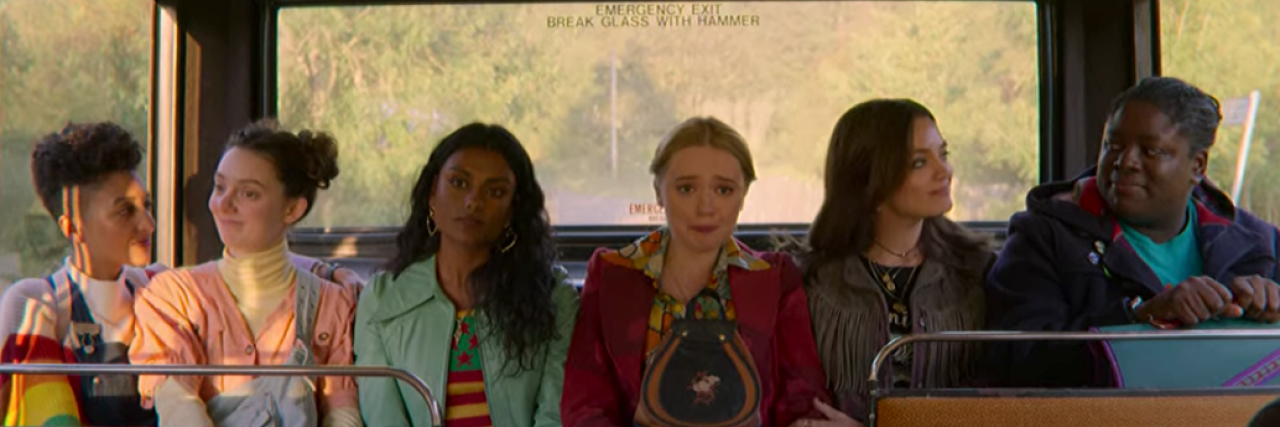Powerful Scene in 'Sex Education' Shows One Way We Can Support Sexual Assault Survivors
Editor's Note
Warning: This post contains spoilers for season two of Netflix’s “Sex Education.”
If you’ve experienced sexual abuse or assault, the following post describes sexual acts and could be potentially triggering. You can contact The National Sexual Assault Telephone Hotline at 1-800-656-4673.
Mighty Warriors, clear your schedule, hop into some comfies, grab a box of Kleenex and go binge-watch the brilliant series “Sex Education” on Netflix. Many television shows have tackled the subject of teenage life, high school and even young love, but I can’t think of one that has so bravely, poignantly and humorously delved into the challenges faced by teenagers, teachers and parents as this one has.
A word of warning for those who have histories of sexual trauma, the show doesn’t hold back, is explicit and quite graphic. If you tend to get triggered by sexual content or descriptions of sexual acts, this show may not be for you.
“Sex Education” focuses on the main character Otis, the teenage son of a well-known sex therapist. He finds himself teaming up with a genius misfit named Maeve to start offering sex therapy to fellow students at a British high school. As the series unfolds, the script tackles themes such as racism, sexism, toxic masculinity, homophobia, abortion, bullying, jock culture, poverty, divorce, parenting, substance abuse and, of course, sex education in every permutation, from consent and STIs to the pervasiveness of sexual assault and how it can change a survivor’s life forever. As a survivor of sexual abuse, I cannot applaud the show enough for honestly depicting the devastation that follows being sexually violated.
In season two, Aimee, one of the female characters, is assaulted while taking her usual bus to school. A man behind her masturbates and ejaculates all over her jeans. When she arrives at school, she pretends as though nothing happened, but is encouraged by her friend Maeve to report the incident to the police. After much coercing, she does. In characteristic fashion, she is questioned about her behavior (she smiled at the perpetrator), the jeans are confiscated and she is told that these kinds of incidents seldom result in arrests or prosecution.
We subsequently see Aimee grapple with the fallout of her assault and develop many of the classic hallmarks of post-traumatic stress disorder (PTSD). She stops taking the bus and walks, she sees the perpetrator everywhere and can no longer have sex with her boyfriend. She also has anxiety and no longer feels safe in the world.
In a particularly moving scene, several of the high school girls are in detention. When asked if they could find anything in common with one another, the single thing they could settle on was having all been victims of various types of sexual harassment and assault. The girls decide to band together and in a show of female solidarity, they help Aimee overcome her fear by riding the bus with her as she takes back control of her life through tears of relief.
This plotline and the bus scene have gone viral on social media with many calling it one of the best pieces of television to air in years. And I understand why, not just because I’m a survivor of sexual violence, but because I’m a woman who has grown up in a society where the objectification, exploitation and violence against women has been normalized. I found myself moved to tears and also angered on behalf of the characters and of women in general.
Having your body violated in this way, regardless of the actual details of the assault, removes all sense of control and makes you feel incredible shame for not having been able to stop it. You begin to question everything. You are pressed to defend what you wore, what you had to drink, who you were with and if you were clear about saying no. People either disbelieve you or minimize what happened because to acknowledge it would put into limbo the status quo they have been socialized to and find comfortable, even if it is dysfunctional.
I personally experienced a similar act when I was a child and even though I’ve done extensive therapy, to this day I can still smell, taste and feel semen on my skin and clothing. I too developed intense anxiety and fear around sexuality and even watching this show was fraught with emotions of shame and embarrassment mixed with curiosity. I have seen my abuser standing in random places completely outside the context of where my abuse occurred even though he’s been dead for years. I often feel unsafe and I generally feel like I want to crawl out of my own skin. This is a normal response and this is what sexual violence does to a survivor.
Seeing this experience depicted in such a detailed manner on television was both liberating and validating to me as a survivor. Often we feel alone and like something is broken inside us that nobody could possibly understand. Sadly, the reality is that we are not alone and there are many who understand from personal experience or from the experience of someone they know and love.
Social change cannot occur without having a serious and meaningful dialogue about the existence of a problem. Because we are so culturally media-driven, media has a unique opportunity to be a platform from which we can launch these discussions. I’m thankful that this show did just that. I would highly recommend sharing this particular part of the series to anyone, particularly teenage boys and girls. It would be a most valuable lesson in the consequences of your actions, respect for others and the effects of trauma on long-term physical and psychological health.
You can watch season 1 and 2 of “Sex Education” on Netflix.
Screenshot via Netflix

